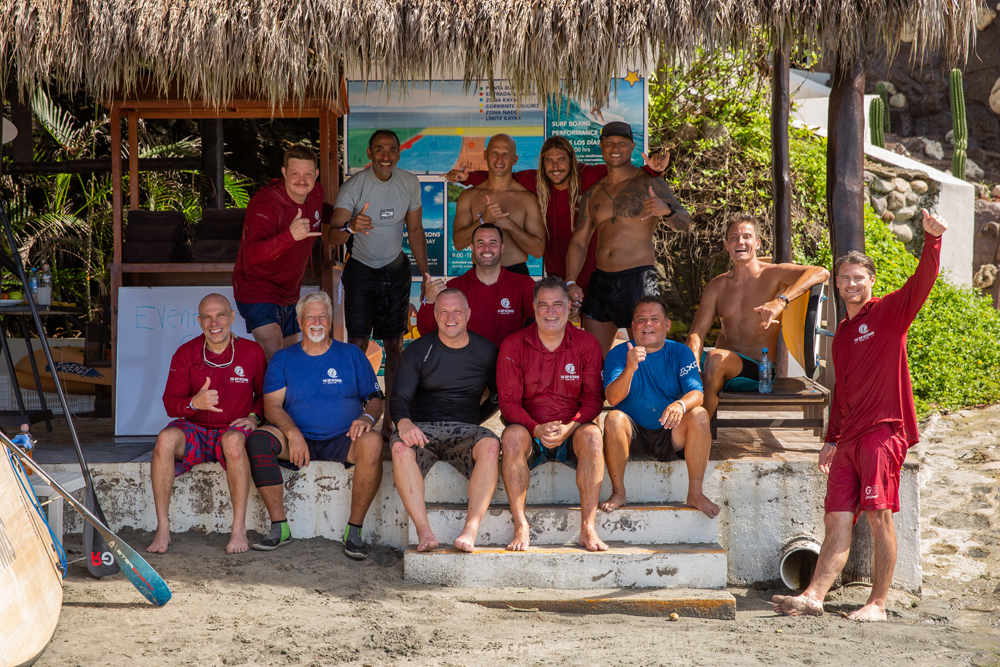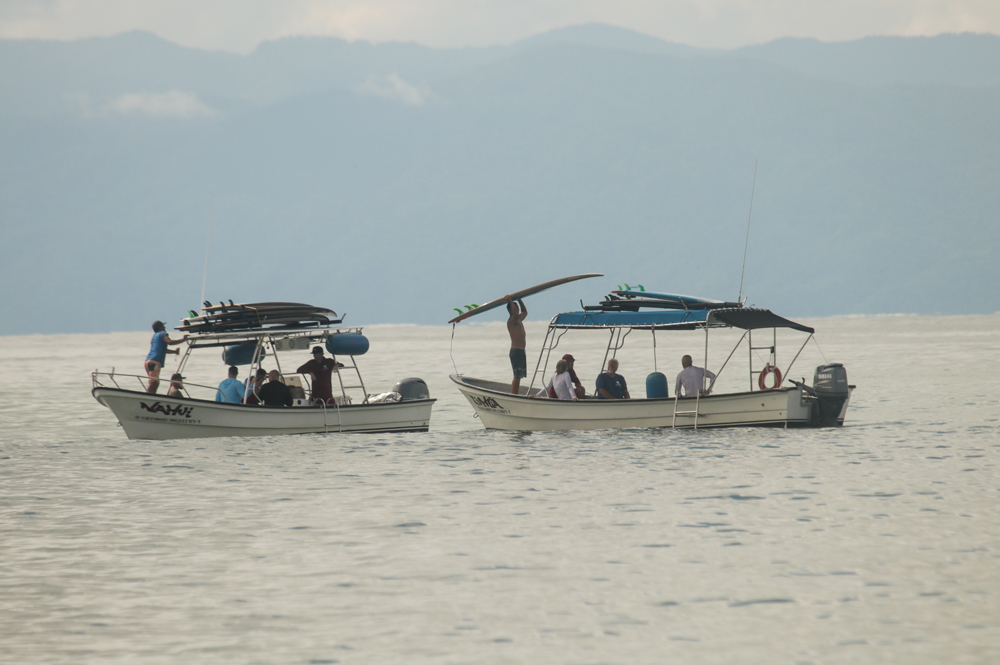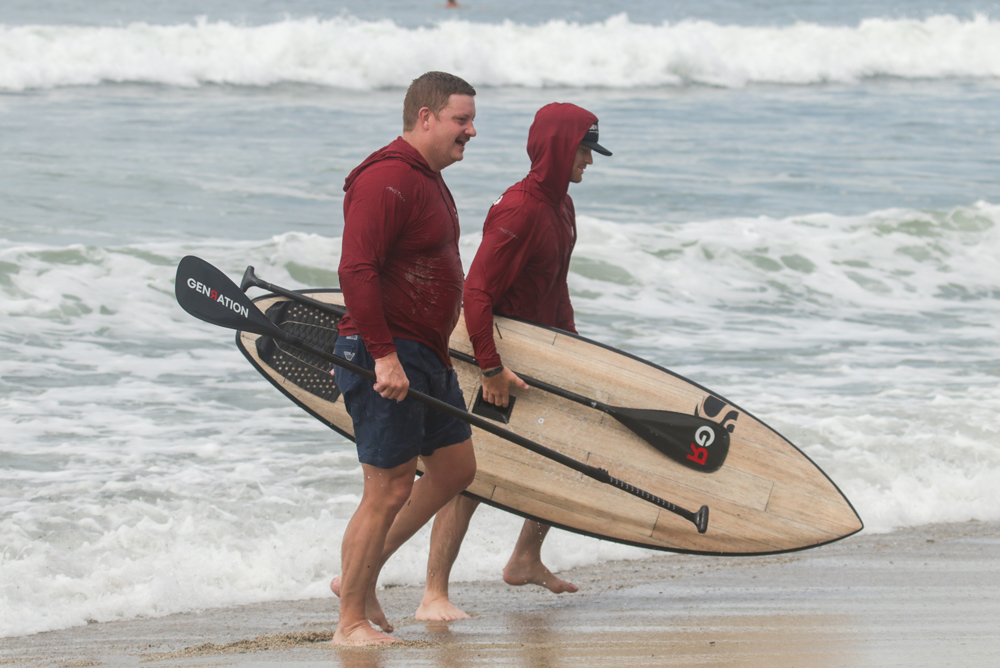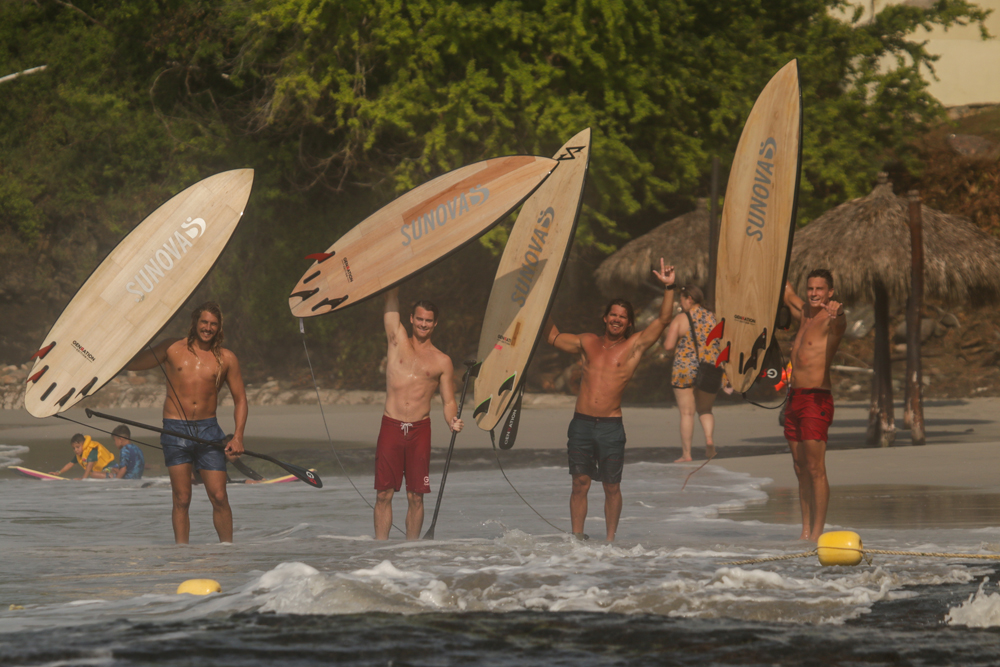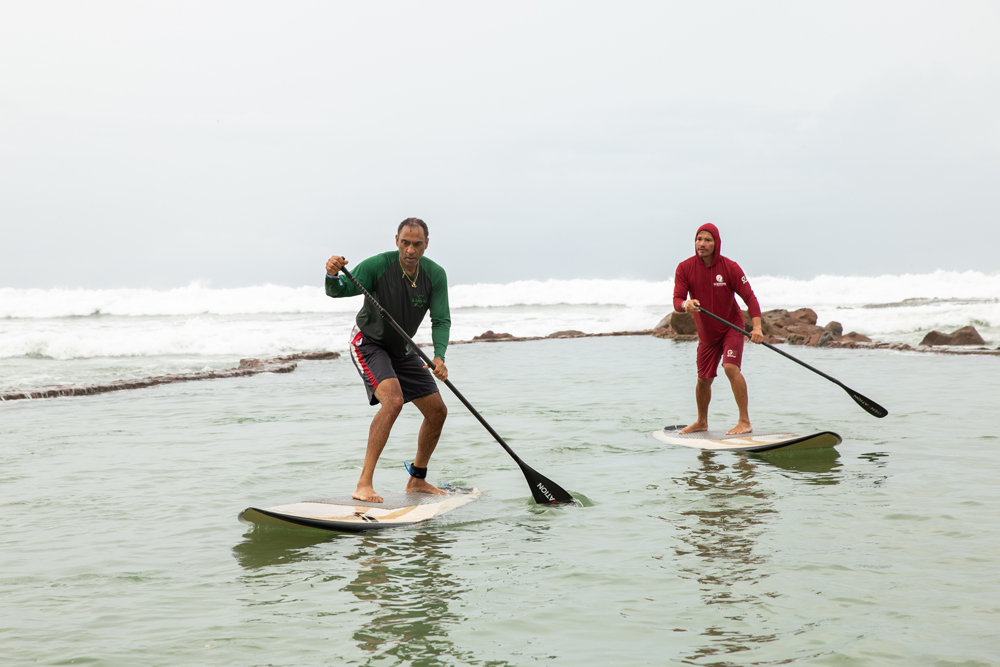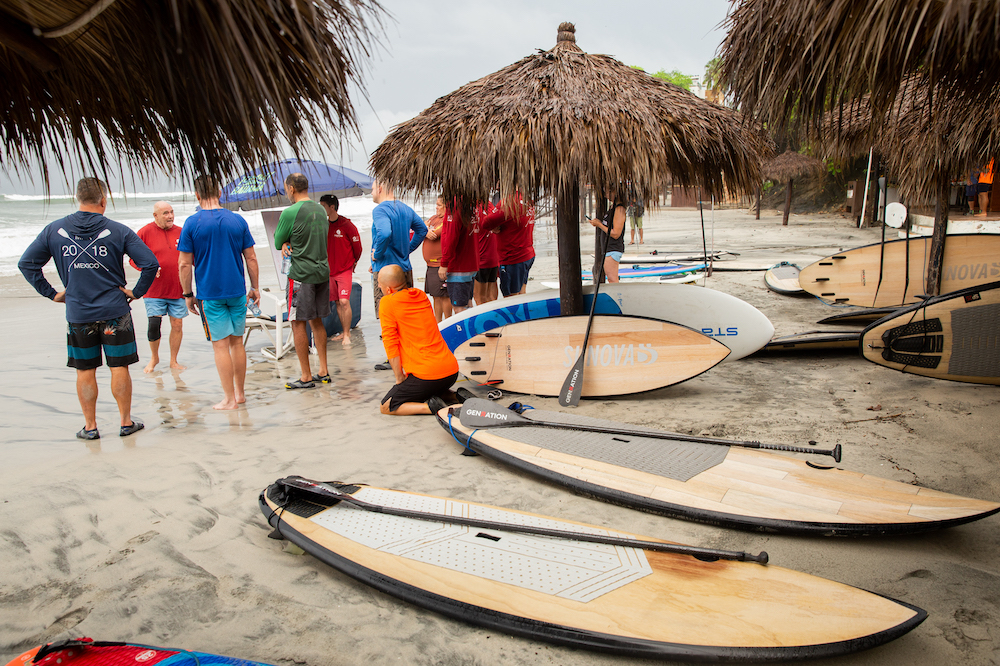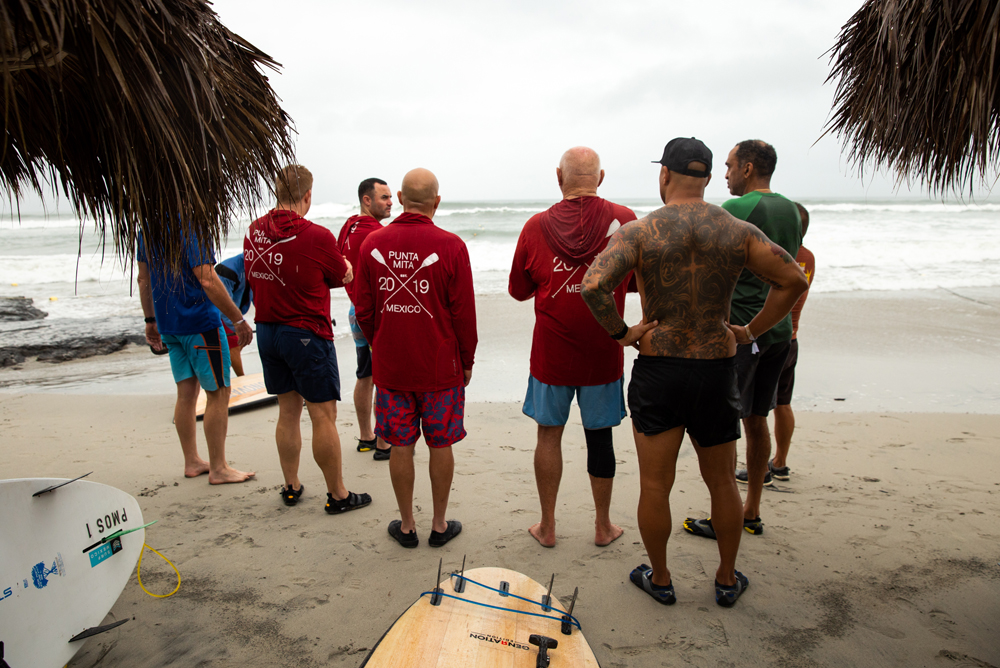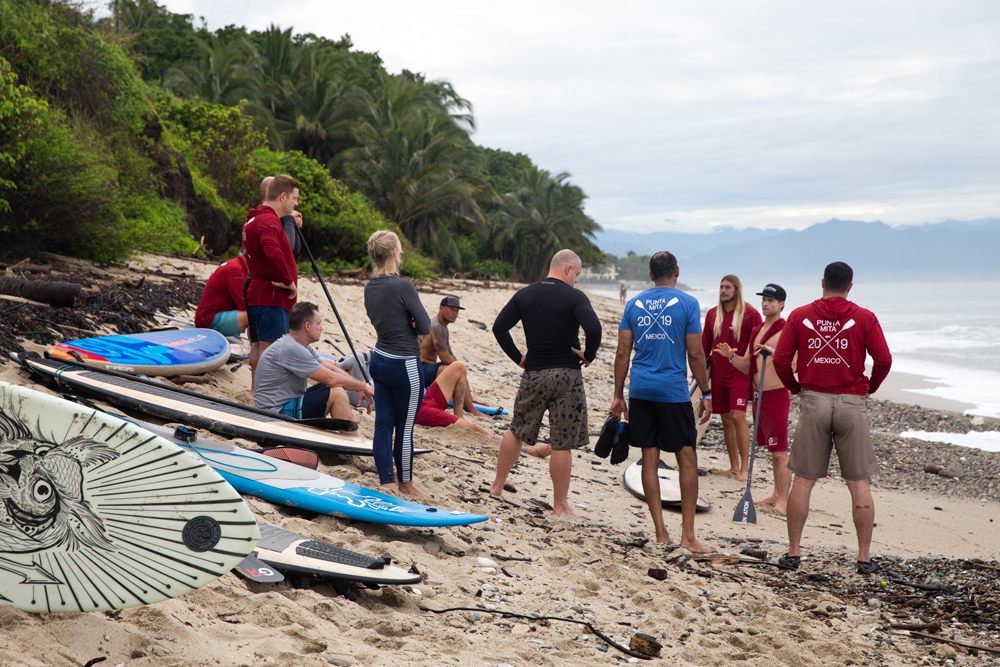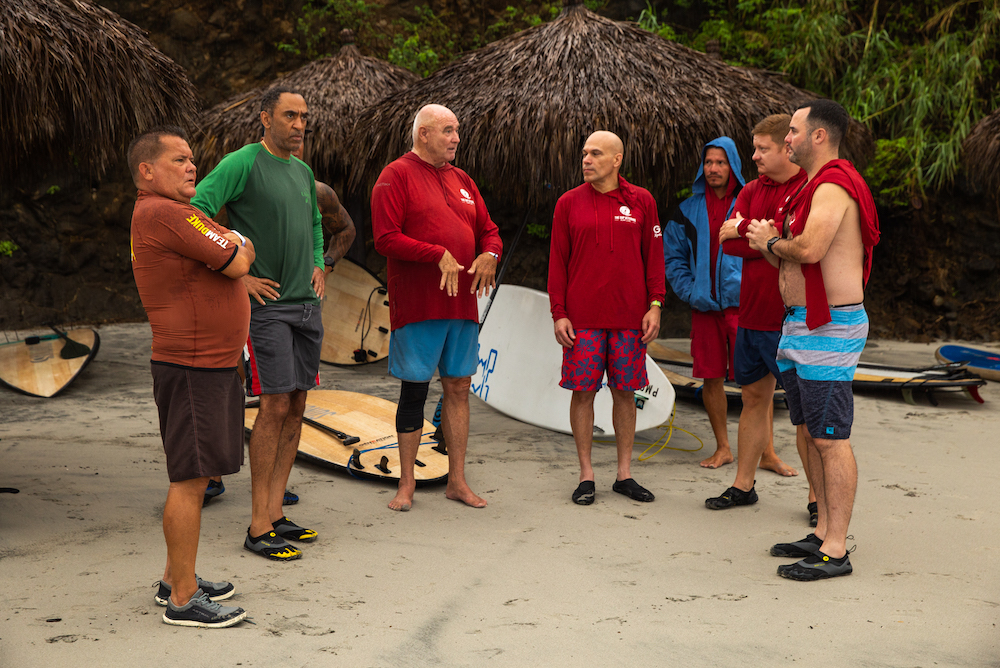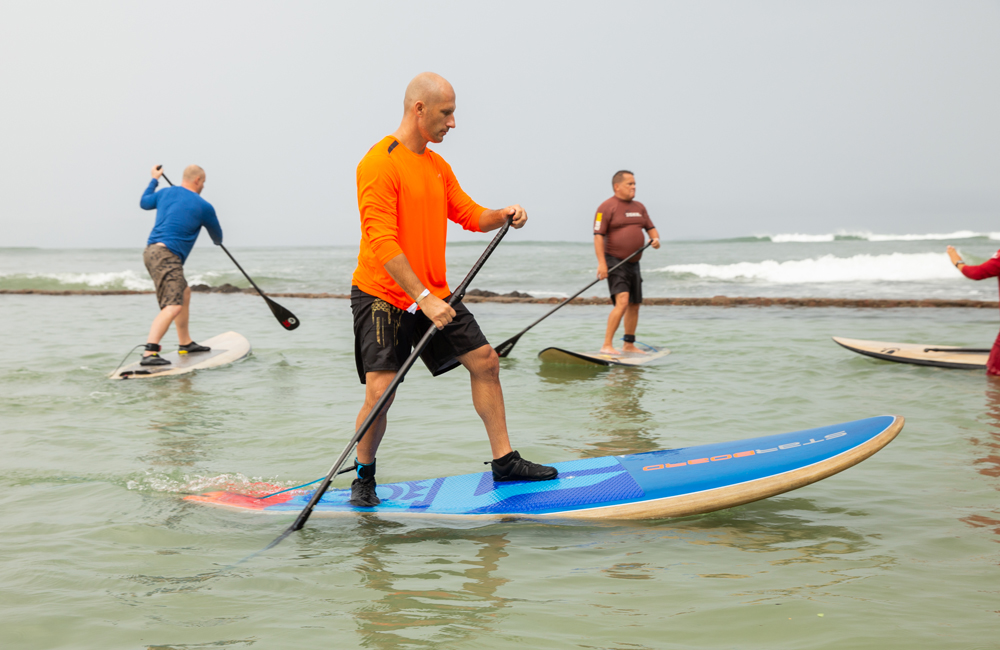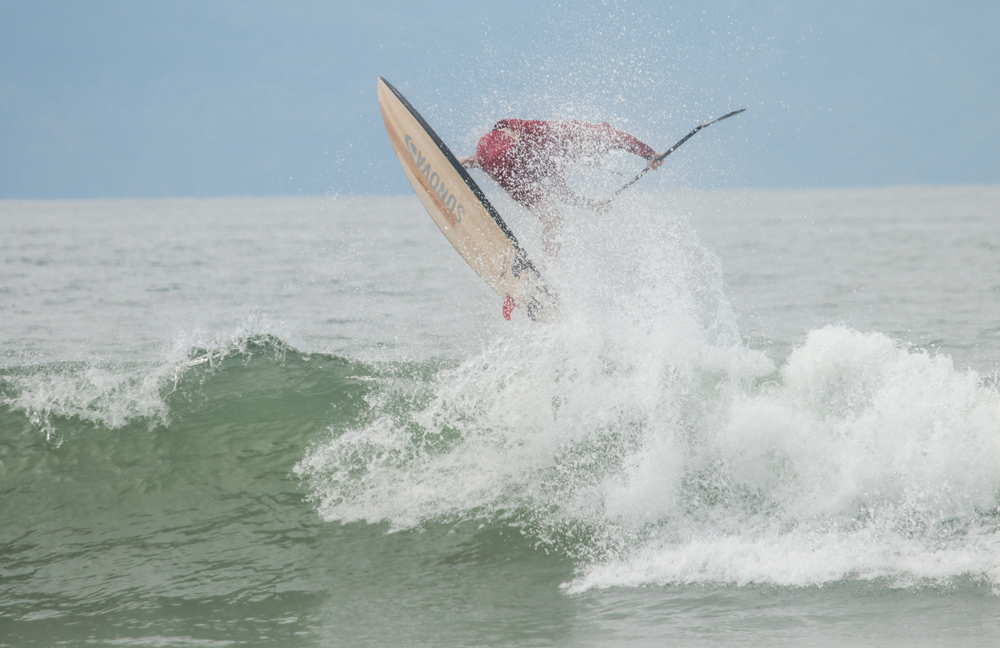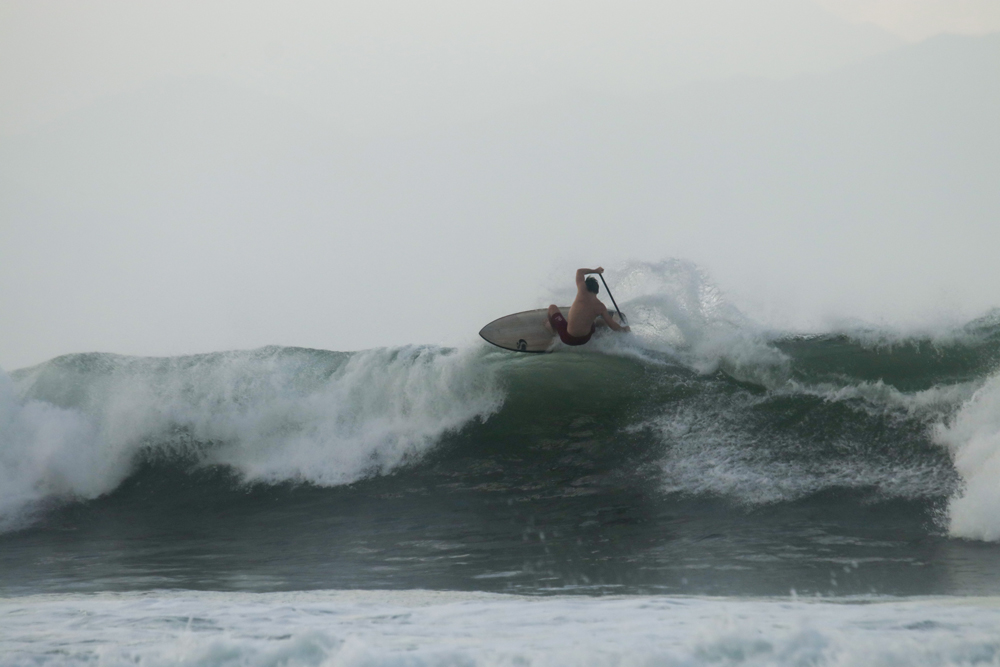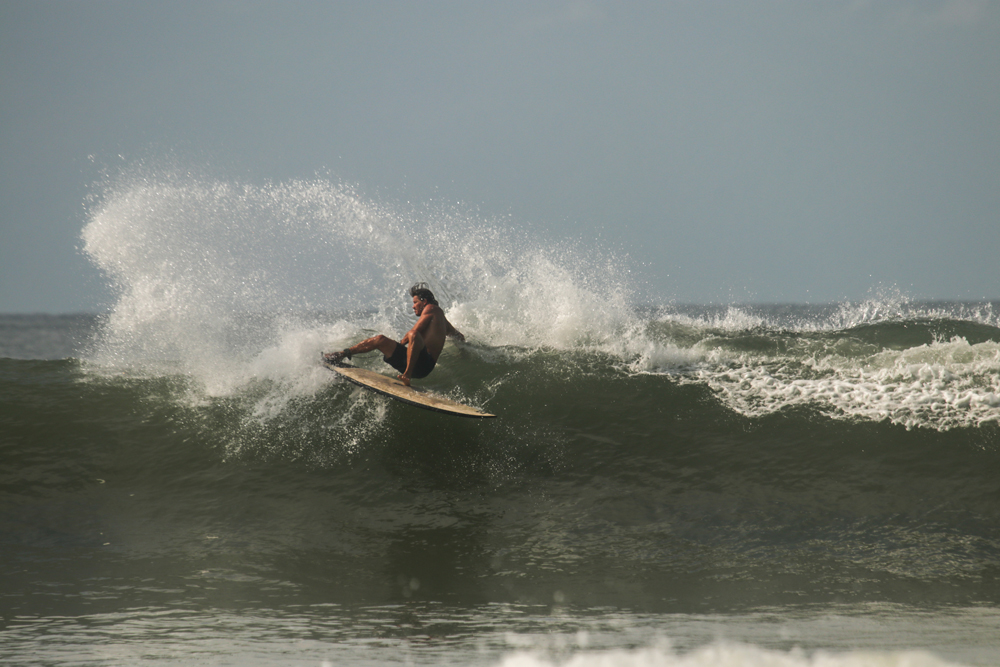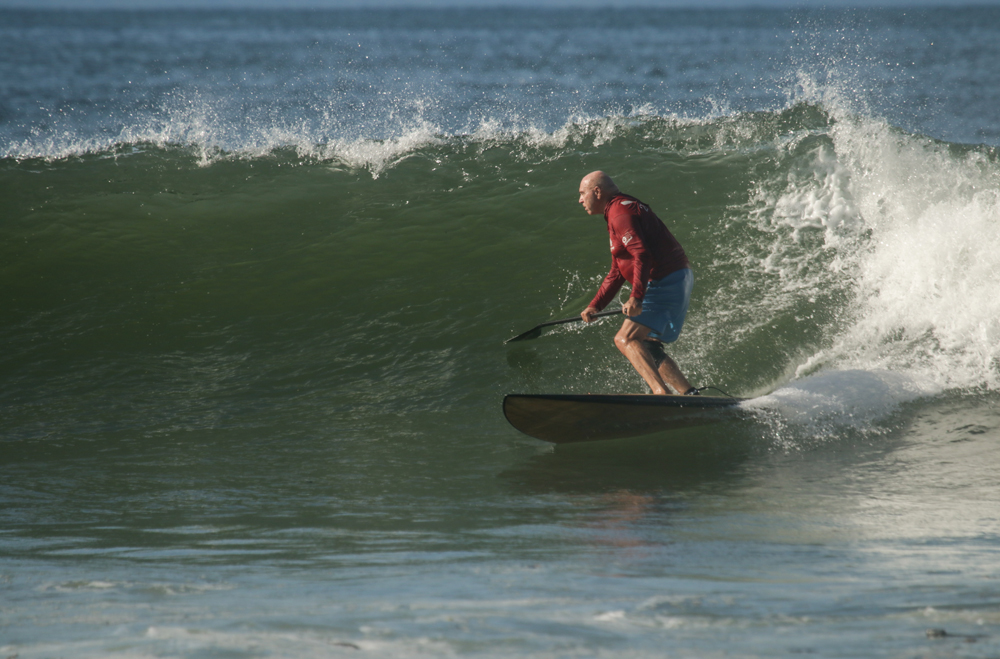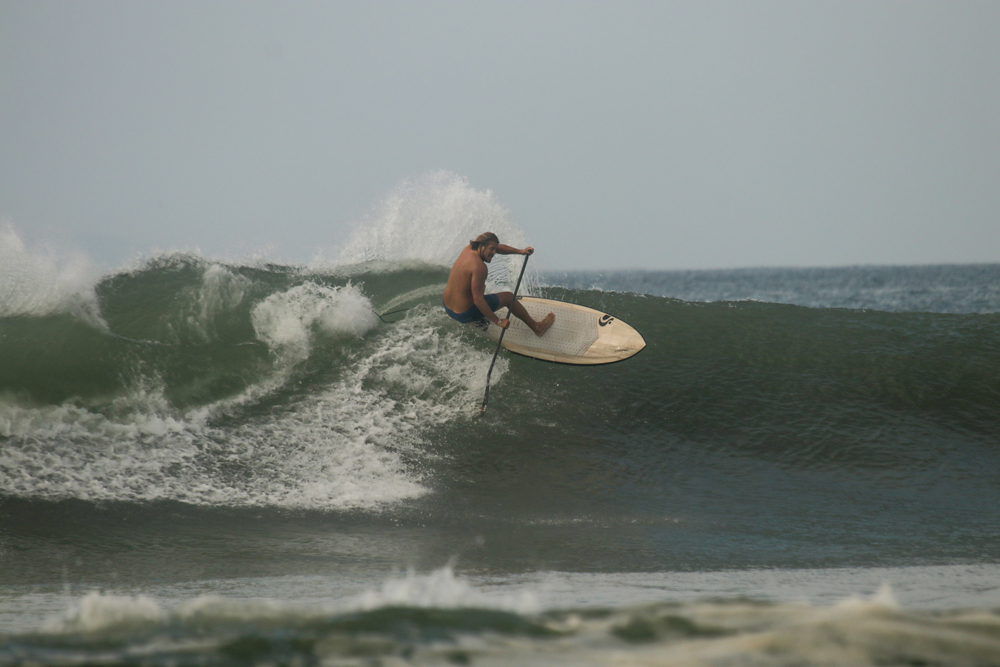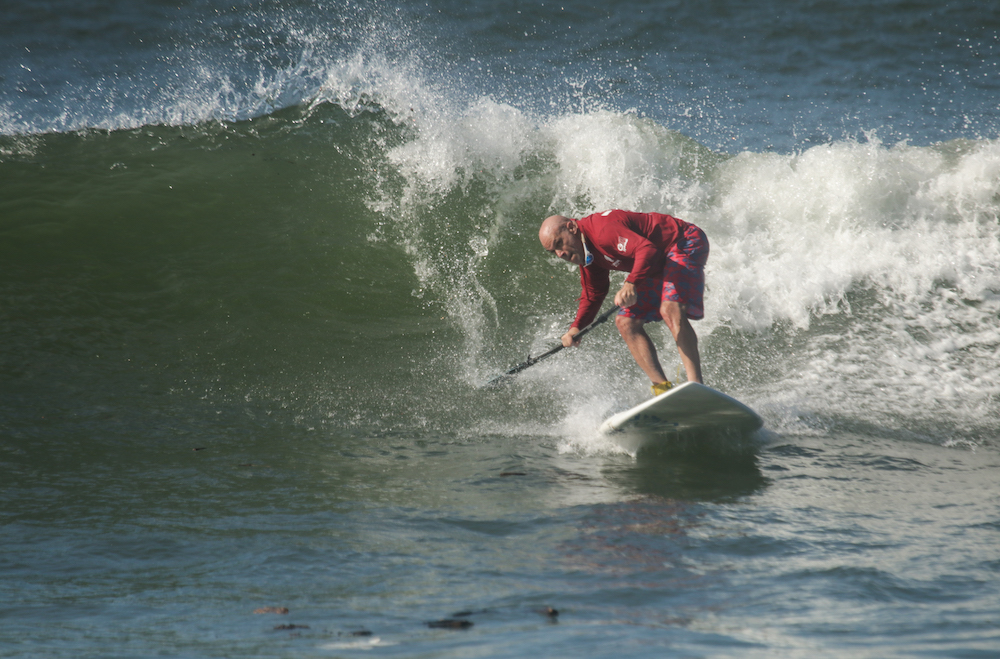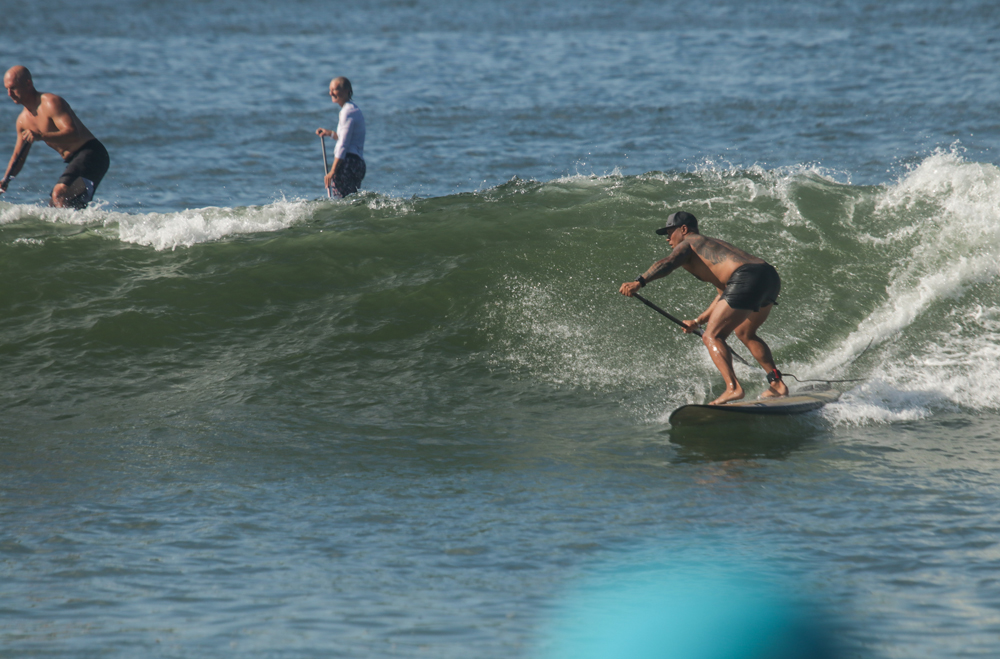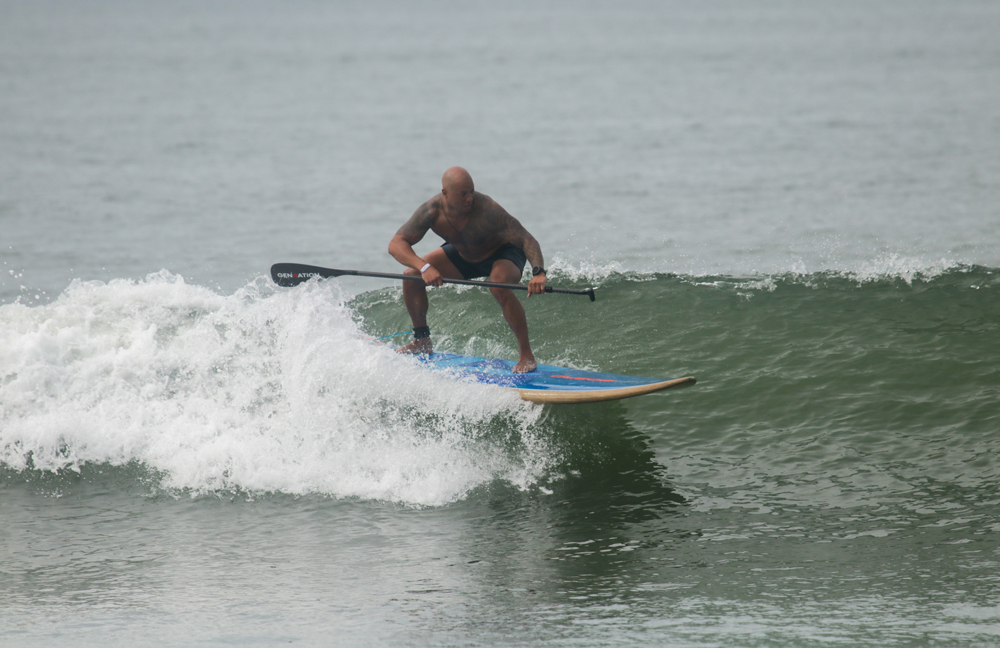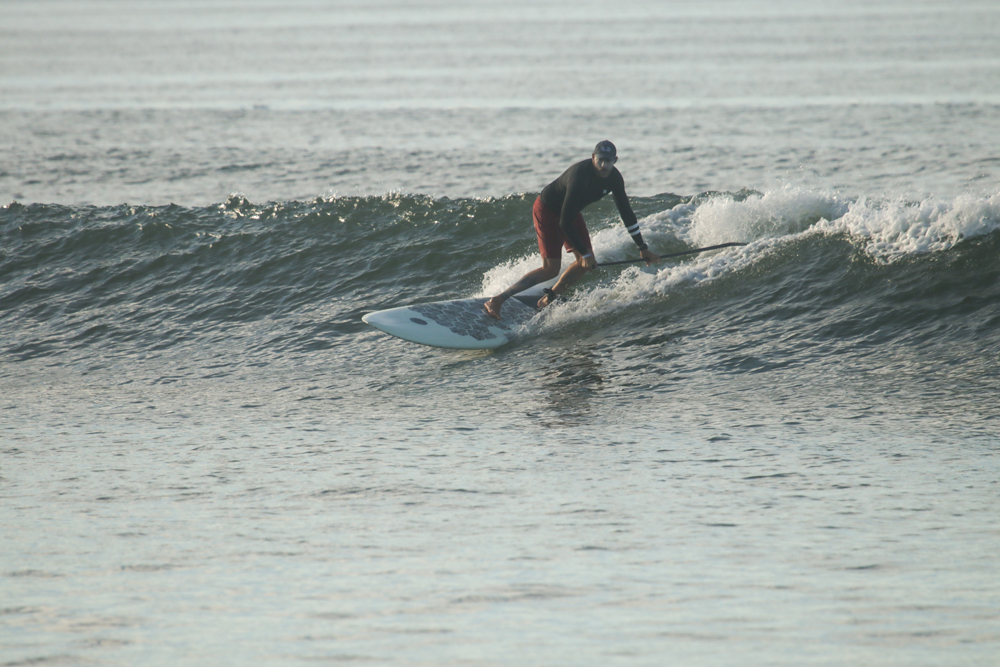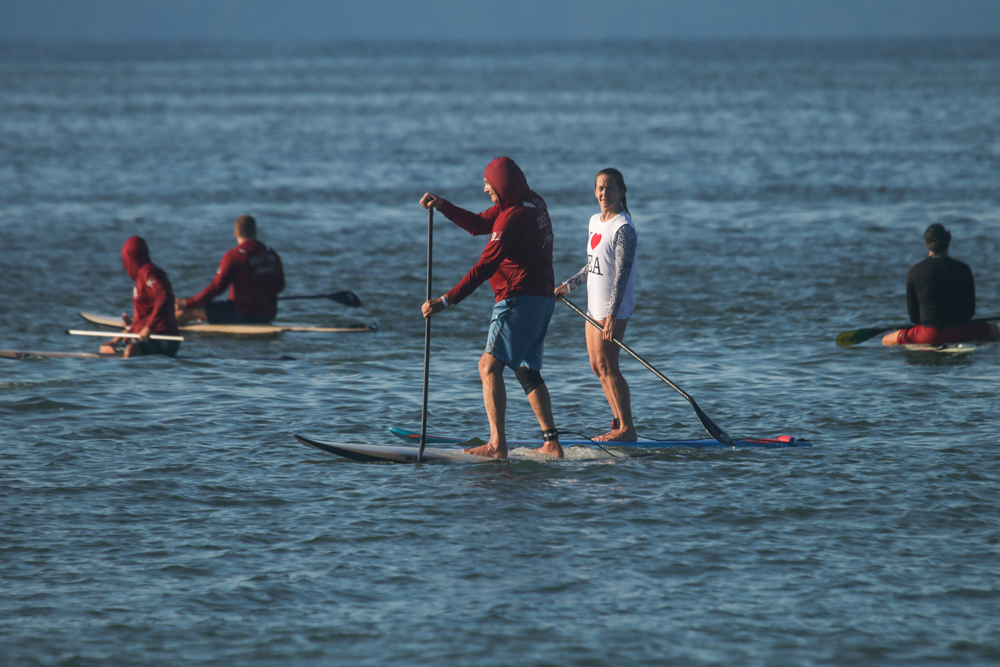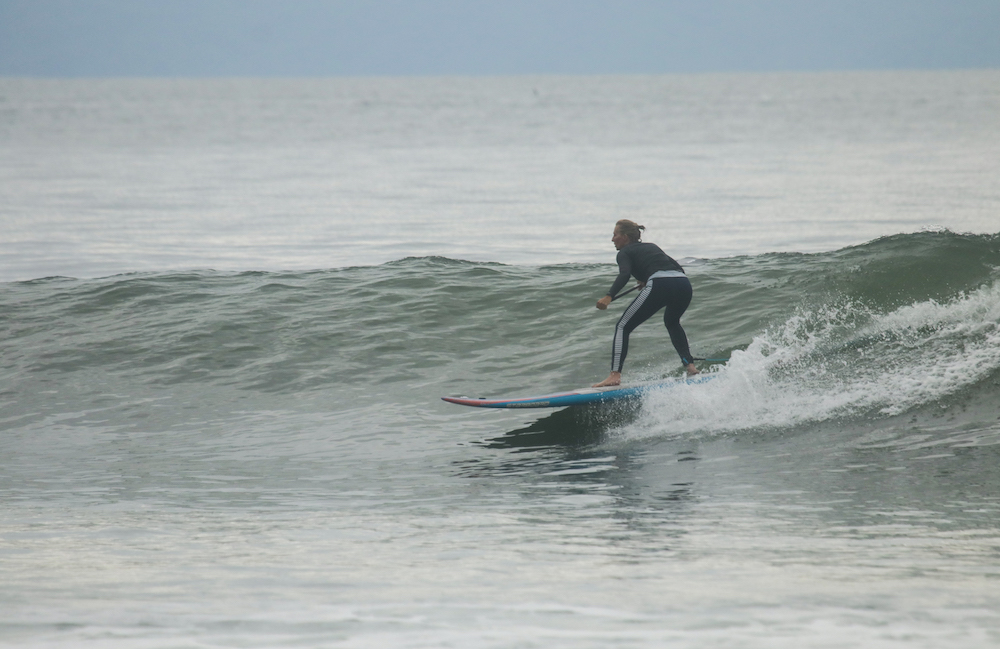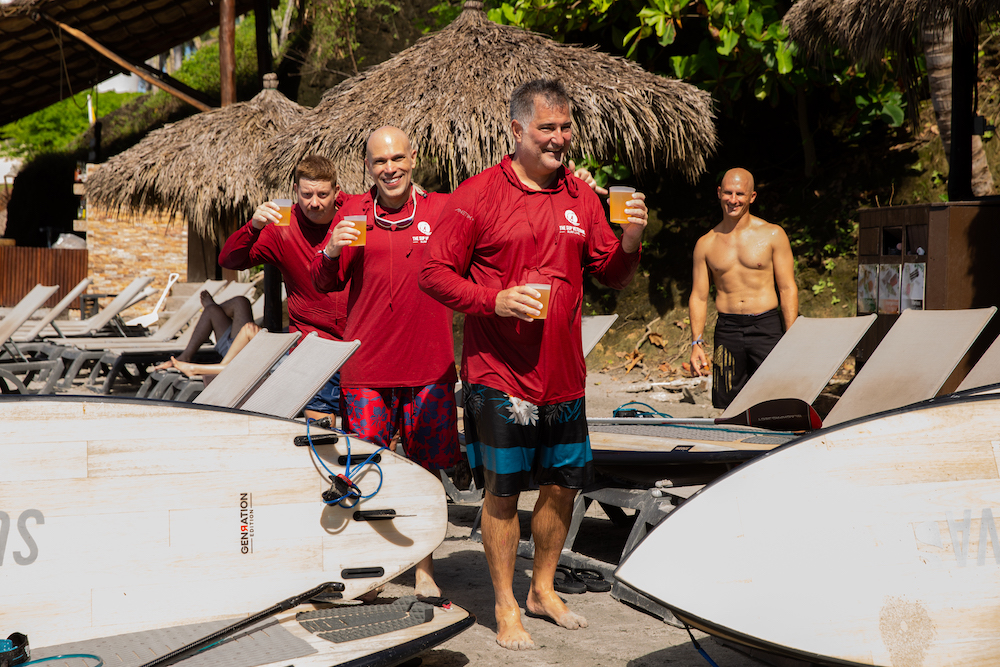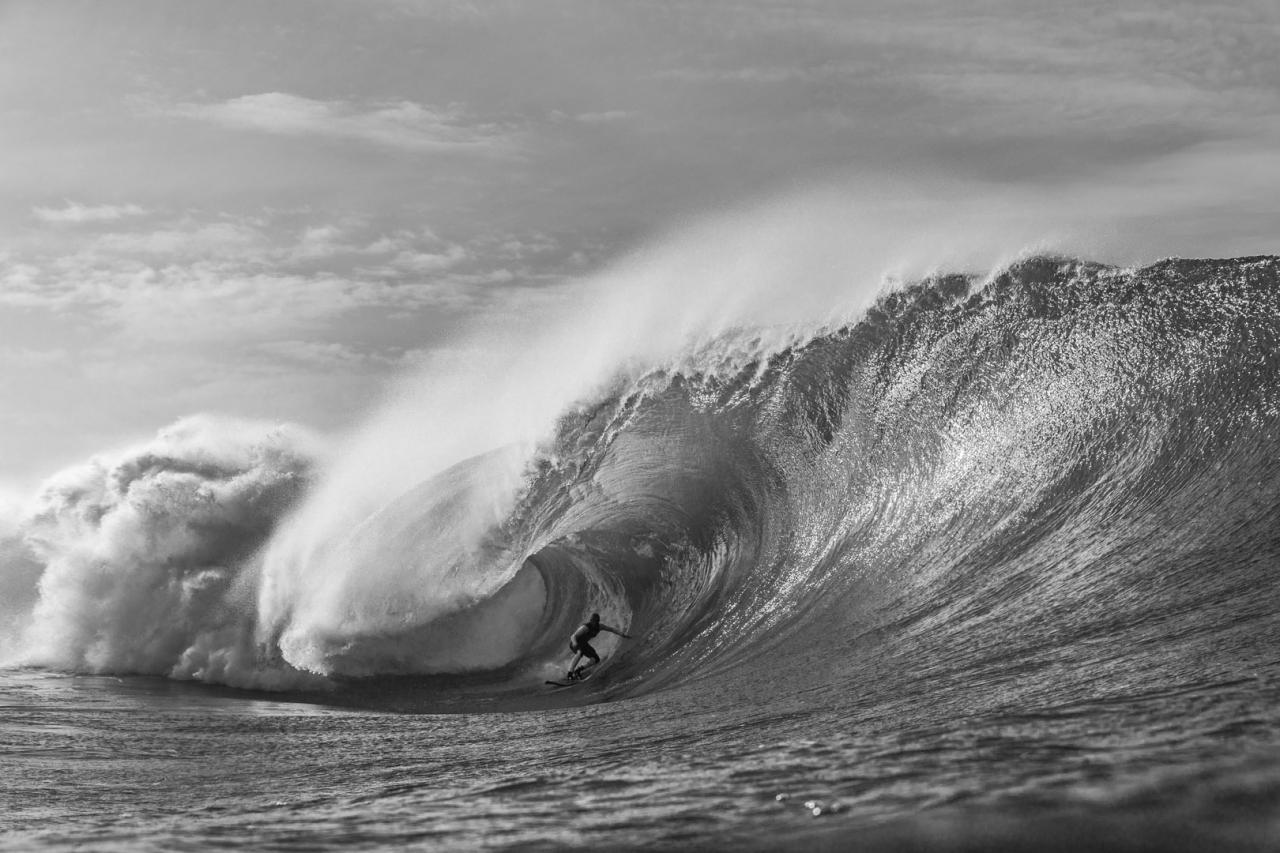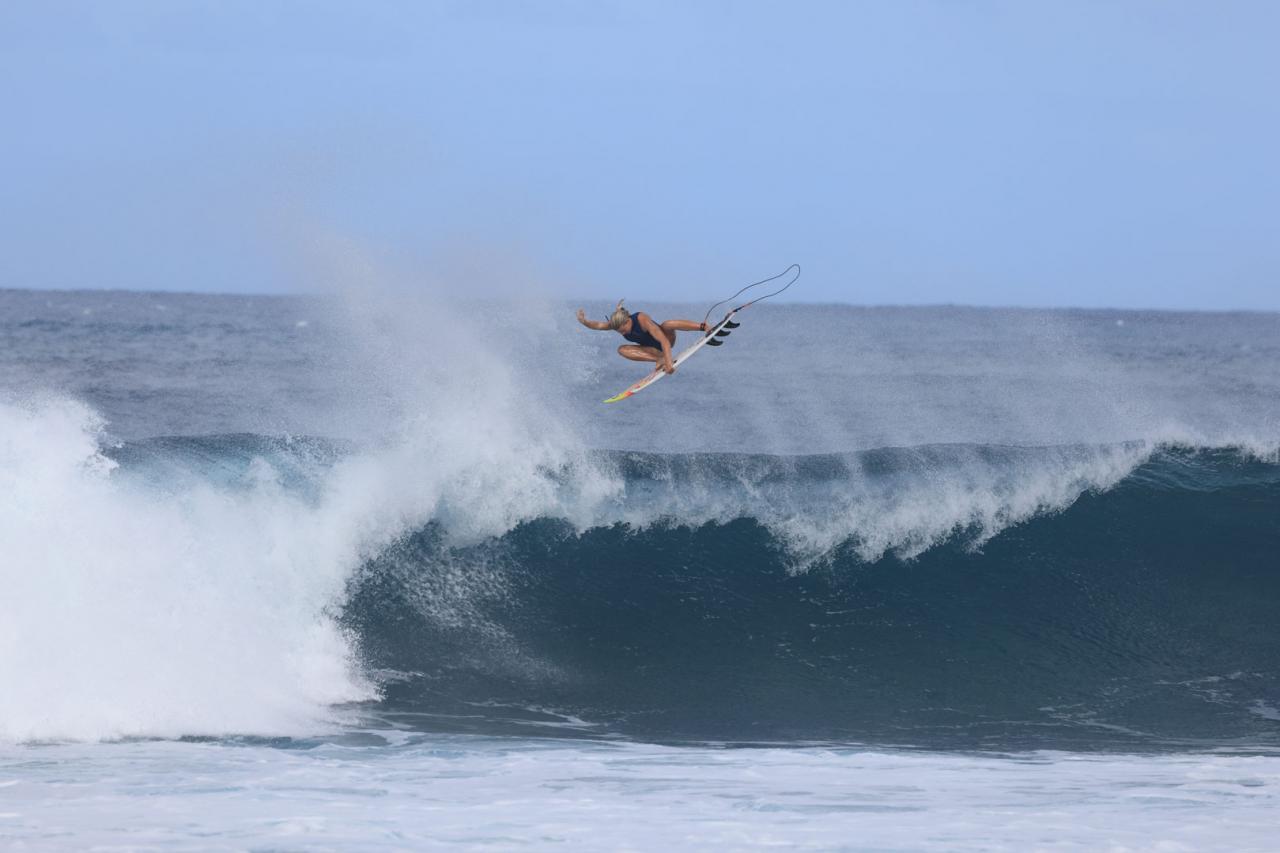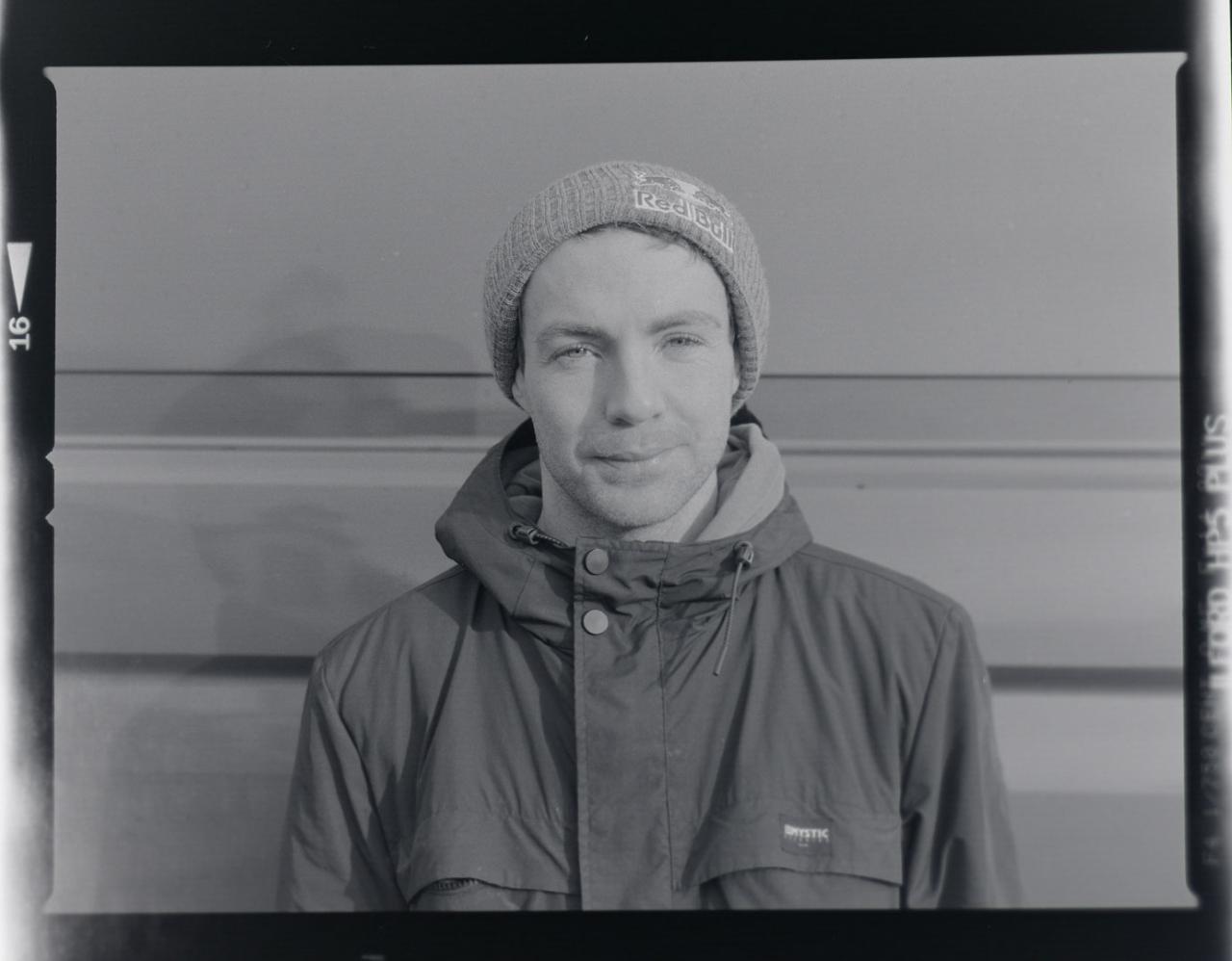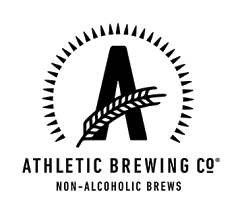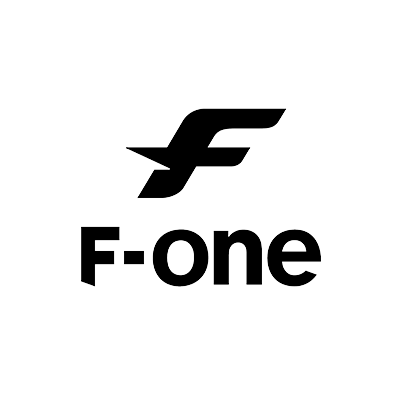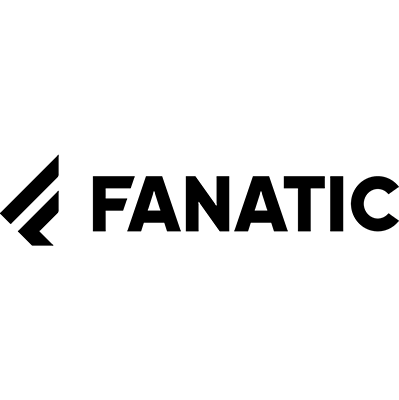Spending time with 12 United States military veterans and active servicemen in a place like Punta de Mita, Mexico, is no small feat. You have to bring your A-game every day, because that’s how they operate all the time. Their level of knowledge about certain subject matters is profound, their art of perception is unique and their capacity to learn a new skill like SUP surfing is voracious. If you ever want to get yourself motivated to learn something new, spend some time around vets. The conversation is different.
FORCE MODULE: A grouping of combat, combat support, and combat service support forces, with their accompanying supplies, and the required non unit resupply and personnel.
The SUP Veterans is a uniquely designed non-profit organization that gives U.S. veterans and active duty military servicemen and women an opportunity to decompress by learning how to stand up paddle surf with world class coaches in an all expense paid, deluxe setting at the Grand Palladium Resorts Vallarta in Punta de Mita, Mexico. Led by the team at GenRation, coaches include world champion SUP surfer and GenRation co-founder Sean Poynter, Bronze medalist in SUP surfing at the Pan American Games Daniel Hughes, Ian “Kanga” Cairns, former world champion surfer and founding father of professional surfing, and last but not least, local SUP surf legend Felipe Hernandez. Also in the mix is GenRation co-founder and serial entrepreneur Loren “Sax'' Saxby of California.
The SUP Vets retreat offers five days of complete immersion in the practice and skills training of learning how to SUP surf, from any level, while connecting with other veterans in a private setting with a spectacular view of the ocean. Many studies have shown that almost every veteran suffers from some level of PTSD. It is a by-product of the work they have been engaged in. The purpose of this retreat is to bring vets together to recreate the deep bonds experienced on active duty, and to give them a joint “mission” to work towards: that of catching waves every day.
SUP Vets History:
The SUP Veterans non-profit organization was founded in 2018 by James “Bart” Bartelloni (former Navy FA-18 & Top Gun pilot), Wesley Spence (retired Navy SEAL), Richard “Whit” Whittington (West Point graduate & retired Army Infantry Ranger) and Tim Evnin (non-military entrepreneur).
The first retreat to Punta de Mita in 2019 (See Standup Journal’s Spring’20 issue) brought together veterans from around the country. The experience was rich and diverse, and created a deep shift for everyone involved. The camaraderie that unfolded was real and invaluable, the laughter rang loud, the stories told brought everyone together in a way that no one could have anticipated and their time on the water forged a brotherhood that holds fast to this day.
As founding member Bart Bartelloni asks at each retreat, “Has anyone heard of the Butterfly Effect?” This concept, discovered by meteorologist Edward Lorenz in the 1960’s, reveals that tiny changes - like a butterfly flapping its wings - can create large-scale atmospheric changes thousands of miles away. A small action can have cascading results. Bart’s vision for The SUP Vets program is to create this dynamic through giving back to his veteran community in this all expense paid retreat, in order to bring them wellness, connection and an ongoing relationship to the ocean and with each other. He asks only that they pay it forward. Bart says his relationship with the ocean has completely changed his life. To see him in action is to witness that truth. Sitting beside him in the water or witnessing his good energy at the dinner table, one understands that Bart’s exuberance for living and gratitude for his comrades is the driving force behind The SUP Vets.
Co-founder Wesley Spence also speaks to The SUP Vets experience in philosophical terms, likening it to an ancient Japanese ritual, a “Misogi event”. The Misogi event is an action performed that tests one’s abilities in a foreign environment. It is a task that is extremely challenging, giving the individual only a 50% chance of success. The idea of taking on such a challenge offers participants an opportunity to radically expand their sense of what is possible. As Spence challenges the men and women in his charge, “How can you reach the edge of your potential without risking failure?” His promise is that The SUP Vets experience will test the skill and mindset of each veteran in the ocean, an unknown element for many, thereby encouraging them to strive hard and find a new level of possibility within themselves.
Both of these visions lie at the core of The SUP Vets experience. Military members are trained to rise to a challenge, focus together on the mission, forge friendships and support one another. At the end of their intensive 5-day SUP surfing experience in Punta de Mita, they are proficient in new skills that they will take home to keep them connected to the healing power of the ocean.
SOP: Standard Operating Procedure
A day on The SUP Vets retreat:
0700: Wake up & chow
0830: Briefing: GenRation surf coaches discuss ocean conditions, safety hazards and surf skills in a beachside classroom style setting.
0900: Progression Session: Either in ‘the pool’ - a flatwater area where the vets work on their balance, stance and stroke technique - or in the surf.
1200: Mid-day Chow: After a 3-hour Progression session, the unit breaks for lunch.
1330: Video Analysis: Video recording of the morning’s surf / pool sessions. Every veteran receives a daily evaluation on 3 recorded waves plus individual coaching tips in a fun and informative group setting. Shouts of laughter, slow motion reruns of falls and bellows of ‘outstanding!’ often erupt from the group at large. The aim of each man/woman is to avoid the Alpha Charlie ass chewing from Commanding Officer, Ian Cairns.
1500: Action Phase/Afternoon Surf: Troops hump their SUP boards back to the break for an afternoon of surf application from what was learned in the morning session and/or the coach’s review.
1800: Return to base camp for pre-dinner beverage.
1930: Mess: Dining takes place at long tables to gather the full group: 12 vets, 4 coaches, GenRation staff and Kathy Bartolloni, wife of co-founder Bart and a congenial guide for meditation practice offered during the retreat.
2100: Liberty: Choices include return to rooms for early rack time, gathering on the veranda* for laughter, drinks and conversation, or exploring the resort’s exuberant central bar nightlife including entertainment featuring live shows, music and dancing.
2400: Light’s Out
*On the Veranda: In the evenings, after dinner, the second floor balcony of the hotel was where we met, drinks in hand, to do a deep dive into conversation. Chairs were tactically acquired to seat every member on a small, humid balcony overlooking the resort. This became the central meeting ground for the retreat. Military men, surf coaches and journalists let down their guard in order to receive new information, carefully consider alternate points of view, and ask pointed questions to get to the heart of every matter.
Retired Navy Captain Will C. often challenged these sessions by lobbing socratic questions into the fray like a grenade about to go off in the middle of the table. Will’s full intention is to get people out of their ordinary mindsets and to begin thinking differently. Together, on that balcony, we wound deeper and deeper, observing and analyzing the belief systems that had brought us together and taking off layers of armor to see what lay underneath. Will encouraged our responses by asking that we “question anything that makes you feel comfortable.” We all grew from these late-night sessions.
Each night, the discussion was open, varied, and often contentious. A few of the topics covered included: living on nuclear subs, the pull-out from Afghanistan, Whit’s hunting ranch, the suppression of black men & women throughout history and the systems in place that limit our thinking. The veranda became a central tenet to the Misogi event.
Moments of fun lightened the air whenever the discussion became too challenging. Shouts of, “Viva La Mexico!” echoed from that steamy balcony whenever a point was well made. We shouted it at the recently engaged couple in matching outfits who walked by, or found ourselves shouting it just because the rain was pouring down and we were together in solidarity, and happy. Some of the most meaningful moments on this retreat were captured “on the veranda”, where trust was forged between men and women, Army and Navy, students and coaches. This trust and openness became the centerpiece for all other interactions.
Identity Intelligence: The intelligence resulting from the processing of identity attributes concerning individuals, groups, networks or populations of interest.
This year’s SUP Vets retreat brought together 12 men, both active and retired military members. On the water and in the circle sat an Army Infantry Ranger, a retired Navy Captain whose two children are also Naval officers, retired SEALS - a breacher and a commanding officer, to be exact - a Navy Air Force F-18 pilot, a US Navy FA-18 Naval attache to both Argentina and Pakistan, an Army Medic and 3 Army MEDEVAC helicopter pilots.
Being tasked with describing these men is insurmountable. Being asked to bring them to life through writing is like asking the Velveteen Rabbit to put on a ferocious face and curse like a truck driver. The lives they’ve lived, the service rendered, the positions they’ve put themselves in to protect our nation’s security is both humbling and reassuring. They’ve seen hardship. They’ve suffered from PTSD. They came together for one week on the ocean to learn about waves and surfing, to rekindle a camaraderie that is so often lost when they retire or return to civilian living. What I witnessed and experienced in their good company was a world of hope, resilience and an infinite capacity to serve. I hope someday to be like them.
That being said, I think it best to let these warriors speak for themselves. Interviewing some of them post retreat was an honor and a privilege. Here are some of their observations:
DEMILITARIZED ZONE: The Ocean
BEN: This retreat was a special circumstance excursion where you disconnect from everything you know. I went to this retreat with the intention of being a student. I’ve always been hyper aware and highly critical, so it was important to me to be a student. I knew I was one of the few who had a runway since I had been on a board before and I didn’t want that to get in the way of my learning. I went down to this retreat to absorb what people were going to teach me.
It was hard. Every day it was hard. But I did it.
Being taken under Kanga’s wing was more than I could have ever expected and I am supremely grateful for it. Deep water conversations with Sean encouraged me. He was there and also wanted to learn from me about the mental model for handling certain situations. We had great talks.
Since the retreat, I’ve found a renewed willingness to take care of myself physically. All my physical training stopped five years ago when my daughter was diagnosed with cancer. My daily structure has been either I am advancing or I’m in the fox hole. So many days after that diagnosis, I’ve just been in the fox hole, taking bullets, staying put. Then my daughter passed away. I had been going to the ocean daily for solace, but now, because of this retreat, I want to do things outside of the water to strengthen myself again. I know where I want to go. I'm on top of it, focused. Today I want to be competent across the spectrum in watersports. I already surf, SUP and foil. Now I want to be on all boards and be competent in bigger surf.
The one thing I didn’t plan on as a result of this retreat was how it changed my mental orientation. That came about because of how you guys (coaches & staff) treated me and my peer group. There was an innocence and a respect, an immediate acceptance. I’ve never felt that, especially from people who have so much experience in their field. There was “no b.s., no bias, no hubris… an innocence.” It took away a lot of the muck and mental models I had and has inspired me to change my own mental habits.
JOEL:
Like many veterans, I’ve struggled with illness and injuries from combat. One of my doctors suggested I find other veterans with whom I might connect, and somehow I came across thesupvets.org website. Having nothing to lose, I reached out with a message and quickly became friends with Bart.
I had never surfed before. I have terrible balance, and had a hard time standing and staying on my board in calm water. But I never give up and always look for a challenge, so I took advantage of the opportunity to learn, despite the water conditions. One afternoon, a small group of us went out to the break in pretty rough water. Suddenly a storm rolled into the area. I took one crack at a wave and the water was just too rough for me. The wave took me out and my leash immediately snapped. My board was quickly swept away. With the help of the surf instructors, the board was saved just before crashing onto the rocky shore. Then we all swam through the current and back to shore together. While I didn’t catch a wave that day, it was educational and humbling to lose my board and have to fight to get back to the beach through turbulent water.
I feel honored and blessed to have been a part of The SUP Vets retreat. Having never surfed, I knew I was at a bit of a disadvantage, but when else in my life would I have the chance to be taught by the best? I was able to learn a solid foundation and actually ride a wave or two! The great group of instructors, the passionate retreat organizers, and the other veterans in the retreat made this experience something I will never forget.
CHRIS:
When Bart, Wes, and Whit started The SUP Vets two years ago, Bart talked about it and it sounded interesting. While I knew the purpose was to get folks SUP surfing, I really wanted to get back together with other vets. Regardless of the service, deployment, or active duty time, there is something about being with other vets and sharing in fun and laughter. Only vets understand the challenges that were faced on deployments, even if they are not talked about.
For me, balancing on the board was hard. I think the most challenging time was on the second day. We took a boat trip to "calmer" waters since the surf was large at the hotel and had a lot of cross currents. Once we got to the surf area, I kept trying and trying to get a paddling routine so that I could catch a wave. Bart tried to push me to just go for it a few times, but I kept falling and not catching the waves. Unlike when I was 21 and never failed while I was at the Naval Academy and later in Nuclear Power school, I have had a recent string of hard challenges and this seemed like it was no different. I talked myself into not getting discouraged and to keep trying since it was only the second day.
On Friday, the second to the last day of the retreat, we went to a place south of the hotel and got on the water. I remember falling a few times and telling myself, “It’s now or never.” I got up on the board with Daniel close by and when he told me to paddle like crazy, I did. Somehow I managed to stay on top of the board while facing in the right direction. I heard Daniel again call for me to paddle. Then it happened. I started to pick up speed and realized I was going down the wave! I switched my paddle to my right side and used it for balance. It seemed like I was on that wave for a few minutes while it may have been only a few seconds. It's hard to describe the feeling but it was immensely rewarding.
I didn't think I would get surfing because of that recent string of hard challenges and disappointments, but the GenRation instructors were so positive and down to earth. I still can't believe the class of instructors who taught us! Bart mentioned world class instructors, but I never realized who they actually were until I saw some of the videos and accomplishments they had. Another great method of instruction was the video review. I thought I would be embarrassed having others watch me try to stand up on a board that first day, but the instructors and others there did not make me feel that way at all. I felt truly special that such great people spent time with me to teach me how to SUP surf. I wish I could go back right now, COVID or not. It was a great experience that will stay with me.
WILL:
Every year I try to do something physically that I’ve never done before. I’ve never been surfing and this retreat was a humbling experience for me. I want to keep at it and progress. Surfing is a unique physical experience because there is so much going on all at once.That took some getting used to.
For me, I enjoyed exchanging thoughts and ideas with the other veterans. I got a lot out of that and I hope others did as well. It’s important that we share different ways of seeing things especially as we become more and more polarized as a society. It’s important to learn how to create an environment where questioning one’s beliefs and knowledge feels safe. On the retreat we created that space together in the evenings on the veranda.*
Matt:
I went on this retreat because Austin invited me. I had never surfed before and was interested in learning. Austin reached out to the SUP Vets organizers to see if we could come. I couldn’t turn down a free trip to Mexico to learn how to SUP surf from some seriously talented people. The vets angle also meant I would quickly be able to bond with everyone else having this shared experience.
I know there are other U.S. military personnel out there who don’t have the luxury of being around other military personnel on a regular basis. This retreat will allow them to talk about certain things that may bother them, that they are unable to discuss with family or friends who just don’t understand. It’s a chance to feel that camaraderie again while working towards a common goal: riding the waves.
The SUP Vets team and GenRation did an excellent job putting this trip together. They had welcome packets, talked to us frequently prior to the trip, hosted a Zoom call with questions, and ensured we were all prepared. When we arrived in Mexico, they had a driver pick us up and every moment was planned out until they dropped us off a week later. The positive energy that everyone put out was second to none. There are not enough words to explain how welcoming everyone was. I immediately felt a part of a group and enjoyed learning about each of the people in attendance. I recommend this retreat highly, and thank all those who made it possible.
AUSTIN: Via Richard Bubnowski:
Owner of Paddle Surf NJ/ Director of Treasure Island Paddle SUP Race
About two years ago through a random inquiry, Austin sent me an email. Austin and his crew were in Afghanistan. Some of the younger guys were a little homesick so I sent them some tee shirts, stickers, swag, etc. There’s a Paddle Surf NJ sticker on the wall in some Afghan coffee house. Once Austin returned to the States, we connected and have gone surfing a few times. He’s a really great guy.
Loren Saxby: SUP Vets Co-Founder
As a child I lived with both of my grandparents for some time. My grandfather and I had a close relationship and one I will never forget. One day, he handed me a keepsake without much of a story behind it, other than it was important to him and he gave it to me.
This memento was an old patch that my grandfather wore on his uniform in World War II and all he told me at the time was that the "T" and "O" on the insignia stood for "Texas Oklahoma", the Army division he fought in, the 90th Infantry Division. It wasn't until my early adulthood that I needed to learn more. I soon discovered that the blood-red "T-O" insignia also stood for "Tough Ombres", and the men who wore that patch fought for fifty-three consecutive days against the Nazis in the most destructive war in history. My grandfather helped liberate Flossenbürg Concentration Camp on April 23rd 1945 and eventually ended up on Hitler’s porch as the war came to an end. Post WWII, my grandfather had also attended the Nuremberg trials and soon after was awarded several medals for his valor.
My grandfather was a hero to me before I learned of this significance, but he redefined the meaning of hero as soon as I became humbled by the history behind what had been sitting in a box for many years. I eventually learned that my grandfather had suffered from extreme PTSD and as one could imagine, there was a heavy past he had to live with while raising a family.
To honor my hero, I had the "T-O" insignia tattooed on my left arm, in the same location where it was placed on his uniform. For a while I kept it hidden from my family because they didn't approve of tattoos; they were highly frowned upon. Eventually, at a family gathering, I revealed it to my grandfather in private and I prefaced by telling him to keep it between the two of us and not to share what I was about to show him with the rest of the family. At the moment of reveal, he recognized what I had done and immediately began sobbing. I had never seen him so emotional in my entire life. We were both emotional, but I still reminded him to keep it between us as I wasn’t ready to show the rest of the family. He then proceeded to leave the room and tell everyone in my family (and I have a big family) what I had done. Man, I was busted, but at that moment I didn't care. My grandfather, my hero, was proud and it was his right to share, not mine. I couldn’t have done it better.
My grandfather passed away shortly after and he gifted me his burial flag that now sits proudly on my mantle. He made it through life’s struggles in ways that I could never relate or fully comprehend. I am blessed to have spent years of my life with a true hero. People like him are the reason why I became involved in The SUP Vets program. Surfing is a major part of my life and has changed me in so many positive ways. I honor my hero each time I help a veteran catch a wave, and that is what keeps us connected.
I know he’s watching from above.
LEARN MORE about The SUP Veterans, visit www.supvets.org.
In order for more servicemen and servicewomen to take part in these healing retreats, The SUP Veterans relies on donations to make these experiences happen. None of the staff are paid and all services are voluntary. 100% of your donation goes directly towards supporting veterans to participate in this program.
Instagram: @thesupvets
Contact: info@thesupvets.org
Donate via PayPal: bart@thesupvets.org or The SUP Veterans Project

